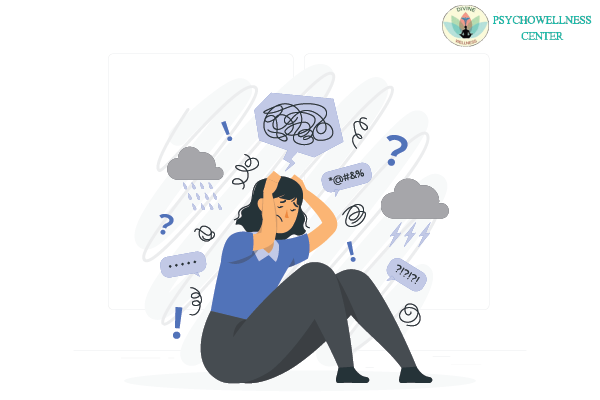What is High Functional Anxiety?
Most of the time, we imagine someone who suffers from anxiety disorder as nervous, overly concerned, and restless. In some circumstances, you might experience fear and dread to the extent that it becomes difficult for you to carry out your daily tasks. You could occasionally overreact. Your heart may race or you may start to perspire physically. When anxiety is functioning at a high level, the fight response is more prevalent, and the person will exert more effort to get through the anxiety. High-functioning anxiety, though not formally acknowledged as a mental health disorder, is characterized by anxious symptoms that do not prevent a person from succeeding in their public life. A person with an anxiety disorder may succeed in some areas, but they will nonetheless feel the worry, stress, and tension that are typically associated with such disorders. High functioning anxiety may make it possible for the person to complete their education, find employment, and fulfill their domestic duties, but it will be very difficult and distressing. Although the process will be difficult, it won’t make them weak.
High functioning anxiety typically refers to either of two things:
-
High functioning anxiety is what someone with more mild anxiety symptoms refers to as when they are not currently experiencing any significant effects in their life.
-
Due to how excessive and enduring they are, anxiety disorders frequently deviate from normal or expected levels of anxiety.
Many of the symptoms connected to anxiety disorders are present in people with high-functioning anxiety. However, despite the fact that their condition may have a significant negative impact on their general quality of life, they do not meet the requirements for an anxiety disorder diagnosis. Men and women with high-functioning anxiety experience significant suffering, but it goes largely unrecognized by society because the tension and stress they experience are not severe enough to significantly interfere with their lives in overt, obvious ways. However, despite continuing to be able to manage their personal and financial affairs, manage their families, attend school, and hold down jobs, people with high-functioning anxiety still experience pain and perform below their full potential. High-functioning anxiety gradually has a negative impact on a person’s physical, psychological, and emotional health; if they don’t seek treatment by searching for the Best psychologist near me, they run the risk of later developing more serious and impairing psychiatric conditions.
What symptoms and indicators are present in high functioning anxiety?
Some common signs and symptoms of High Functioning Anxiety Includes;
-
Constantly over analyzing and over thinking.
-
Fear of making mistakes and the desire for excellence
-
Insomnia and exhaustion
-
The desire to please others and difficulty saying no
-
Tendency to dwell on mistakes from the past
-
Nervous behaviors like nail-biting, hair-flossing, or leg-shaking
-
Excessive worry and trouble expressing emotions
Despite having a successful outward appearance, people with high-functioning anxiety have a number of negative traits, such as:
-
Following lengthy stretches of work-intensive crucial times, poor time management
-
Tendency to judge oneself against others
-
Having trouble relaxing and enjoying the moment, or persistently assuming the worst
-
Feeling overly fearful of the future or feeling intimidated by it, or having trouble turning your mind off
-
Increased risk of substance use disorders
Treatments for High Functioning Anxiety
People with high functioning anxiety often try to hide their symptoms, but doing so only makes their stress and anxiety worse and prevents them from healing. Although high-functioning anxiety is not a clinical disorder, it is a treatable condition, and those who seek assistance and are committed to recovery can anticipate a significant improvement in their symptoms.
-
Cognitive Behavioral Therapy (CBT): The most popular and, undoubtedly, most effective type of therapy for anxiety disorders and symptoms is cognitive behavior therapy (CBT). Meeting with a therapist as part of CBT entails reviewing the client’s thoughts, feelings, and behaviors that fuel anxiety and formulating strategies to change them.
-
Talk Therapy: Some people may find that talking therapy works well for managing their symptoms. You can better understand your anxiety and learn techniques to control your symptoms by talking to a Therapists in delhi or Online counselor.
-
Acceptance and commitment therapy (ACT): Concentrates on helping people in living in the moment and accepting the present without accusation as a means of coping with discomfort.
-
Mindfulness: When you are in a state of mindfulness, you are able to stop thinking about the past or the future and instead focus on the feelings and thoughts that are happening right now.
If you don’t seek help, your worries might not go by themselves and might even get worse over time. Before your anxiety gets worse, consult the Best psychologist in India or a Counseling psychologist. Early intervention makes treatment easier.
Additionally, you may schedule an appointment with the top professional psychologists and receive Mental health counseling at the Psychowellness Centre, which has many locations in Delhi NCR, NOIDA, Faridabad, Janakpuri, Dwarka, and Vasant Vihar.
Contribution: Dr (Prof) R K Suri, Clinical Psychologist, life coach & mentor TalktoAngel & Ms. Swati Yadav, Psychologist.

